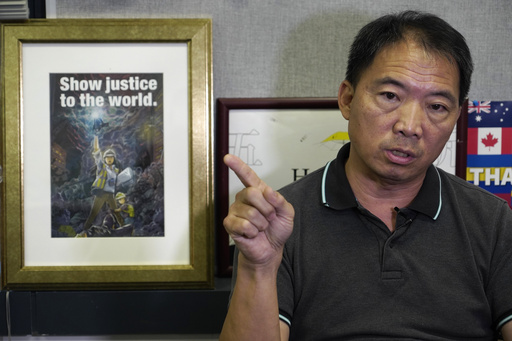
HONG KONG — A group of well-known pro-democracy activists in Hong Kong are set to receive their sentencing on Tuesday in what has become the most significant case under the national security law imposed by Beijing. Critics assert that this law has severely limited political involvement and dissent in the city, which operates under a separate legal and political framework from mainland China.
The convictions of the 45 activists, who were found guilty of conspiracy to commit subversion, are largely viewed as part of a broader campaign by China aimed at stifling democratic aspirations in Hong Kong. Sentences for these activists could reach as high as life imprisonment.
These activists were among 47 charged in 2021 for their role in an unofficial primary election that sought to identify opposition candidates. They were accused of a coordinated plan to veto budgets presented by the government, leveraging a legislative majority to trigger a dissolution of the legislature, thereby forcing the ousting of the city’s leader.
Three judges, appointed by the government, determined that the unofficial primary held in 2020 posed a threat to governmental authority and could potentially lead to a constitutional crisis. Of the 47 charged, 31 activists pleaded guilty, while 14 were convicted after a trial, with two others acquitted. Those who pled guilty are generally believed to have a better chance of receiving lighter sentences.
Some activists have expressed remorse in the hopes of receiving reduced sentences, while others maintain a resolute stance regarding their actions. The following profiles detail a few of the notable activists involved.
Benny Tai, a former law professor, gained prominence during the anti-government protests of 2019. He co-organized a primary election that engaged 610,000 voters, representing over 13% of the city’s registered electorate. The primary was intended to select pro-democracy candidates for the official elections. In statements made during the proceedings, judges described Tai’s assertion that achieving a legislative majority would act as a “constitutional weapon of mass destruction,” intended to allow the opposition to block government budgets.
The judiciary accused Tai of aiming to “undermine, destroy or overthrow the existing political system and structure” of Hong Kong. In plea proceedings, his lawyer maintained that Tai has always advocated for non-violence and believed his actions fell within legal boundaries. Interestingly, Tai’s past did not always place him in the path of conflict with authorities, as he was once awarded a medal for promoting civic education in 2001, a distinction that was later rescinded in 2022.
Another prominent figure is Joshua Wong, who gained recognition as a teenager leading protests against national education in 2012. He became widely known during the Occupy Movement in 2014. Wong co-founded the political party Demosisto in 2016, alongside fellow activists Nathan Law and Agnes Chow. His advocacy during the pro-democracy protests in 2019 led the mainland government to accuse him of pushing for Hong Kong’s independence and soliciting foreign intervention.
Demosisto dissolved after the national security law came into effect in 2020. Although Wong won in the primary election, the government postponed the official election due to concerns over public health amid the pandemic. Wong has pleaded guilty and is also seeking a reduced sentence, expressing hope for personal reform following his time in prison.
Wu Chi-wai, another significant figure, formerly led the Democratic Party, Hong Kong’s largest pro-democracy organization. Although some activists considered his party too moderate, Wu was honored with a medal for community service in 2006. He entered a guilty plea, with his lawyer highlighting his over 30 years of public service and asserting that Wu and his party never aimed to indiscriminately veto budgets. Sadly, he experienced the passing of his parents during his detention and could only attend their funerals briefly.
Finally, Gordon Ng, a dual citizen of Australia and Hong Kong, was initially labeled an organizer of the primary by prosecutors, a claim he firmly denied. He pleaded not guilty to the charges. In delivering their verdict, the judges acknowledged that Ng did not organize the primary nor was he a participant. They pointed to his efforts on social media and through an advertisement in the now-defunct pro-democracy newspaper, Apple Daily, as evidence of his involvement.
In seeking leniency, Ng stated that his support for the primary stemmed from a desire to unify the divided pro-democracy movement, asserting he never pressured candidates to commit to veto government budgets.
